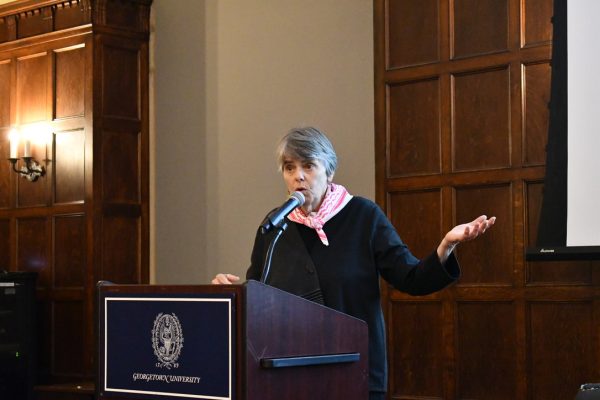Mary Beth Tinker, a key plaintiff in the landmark Supreme Court case Tinker v. Des Moines, delivered a lecture highlighting the connection between student free speech and racial justice movements, emphasizing the enduring importance of free speech rights.
The Georgetown University chapter of the American Civil Liberties Union (GU-ACLU), a student-led affiliate of the legal civil rights advocacy organization, hosted an Oct. 10 event titled “The First Amendment with Mary Beth Tinker.” The lecture commemorated the 55th anniversary of the Tinker decision, a 1969 Supreme Court case that arose when Tinker and her brother John Tinker wore black armbands to protest the Vietnam War in 1965. This pivotal ruling established crucial protections for student and teacher free speech rights in public schools, solidifying its enduring impact on civil liberties in education.

Tinker, who spent a portion of her career as a nurse, said that compassion forms the core of her activism, emphasizing the crucial role of speaking up in advocacy work.
“It’s about caring about what is going on in our world and in our lives and caring enough to then want to have a say about it and to make a difference on it,” Tinker said at the event. “I still find that it’s a good way of life — to speak up about things and to use our rights and to pay attention and to care.”
Tinker discussed the ruling’s significance for youth expression, saying that it affirmed the unique perspectives of young people in society and their right to develop and voice their own opinions.
“You have these wonderful qualities, you have energy, you have creativity,” Tinker said. “It’s very important to society that you are able to express your ideas and get those out there. And as it turns out, it’s good for you.”
Tinker explained the connection between free speech and racial justice and said she and her brother had previously worn black armbands to school in memory of the four young girls killed in the 1963 white supremacist bombing of the 16th Street Baptist Church in Birmingham, Ala., without getting suspended. Tinker noted that black armbands traditionally symbolize grief and mourning, adding that wearing them connected individuals to a collective expression of grief.
Tinker said this connection between racial justice and student free speech illustrates the collective need to advocate for rights.
“It happened because people used their rights,” Tinker said. “They spoke up and used their voices. They noticed when something wasn’t fair. It wasn’t right, and so that got changed.”
The 1969 decision, written by Supreme Court Justice Abe Fortas, affirmed that students and teachers in public schools retain free speech rights so long as they are not disruptive to the learning environment. Cases following the decision limited the rights of students and teachers, arguing that a principal can censor school-sponsored speech and obscene speech.
Tinker said that she believes students’ advocacy today is important because it allows youth voices to constantly be heard and reinforced.
“Now, so many young people are speaking up about so many things, about animal rights, dress codes, Palestine, Gaza, Israel, peace in Israel, the climate,” Tinker said. “I’m sure a lot of you are speaking about so many things as well wanting to have a say in your lives and in your school.”
Kristian Skovrup (CAS ’26), the GU-ACLU criminal justice project director, said he believed the crowd responded positively to Tinker’s event because of a widespread interest in advocacy on campus.
“I think it shows that people are definitely interested in talking about this issue and trying to get perspectives from people who have experienced things that they might be going through or experts,” Skovrup told The Hoya. “They want to have people who are willing to listen to them, and I think Mary Beth has put a lot of emphasis on the fact that she wants to lift up youth voices and really try and have a conversation rather than just give expertise.”
In addressing students’ continued involvement in advocacy, Tinker said that taking action in whatever form remains important for students to continue advocacy.
“Words are powerful. There are so many different ways to take action. Whatever it is that you like to do,” Tinker said. “That’s about taking action. There’s just all kinds of ways that you can take action.”
Tinker said her experience and the continuing legacy of the decision should remind students to voice their opinions.
“I learned a very important lesson,” Tinker said. “You can be scared, nervous — you can even back down. And you can still do something. You can still speak up.”